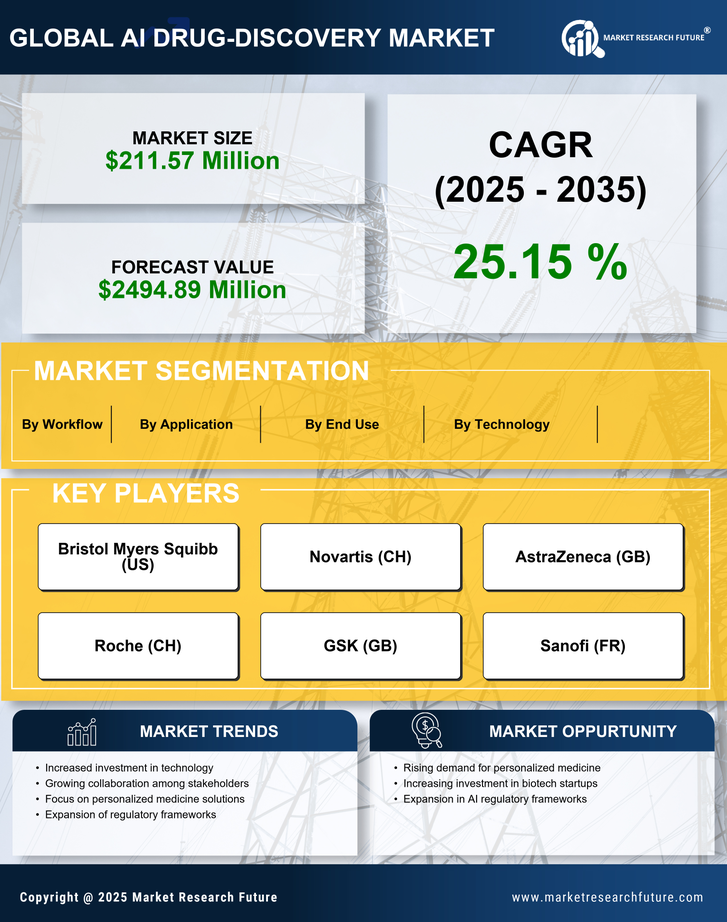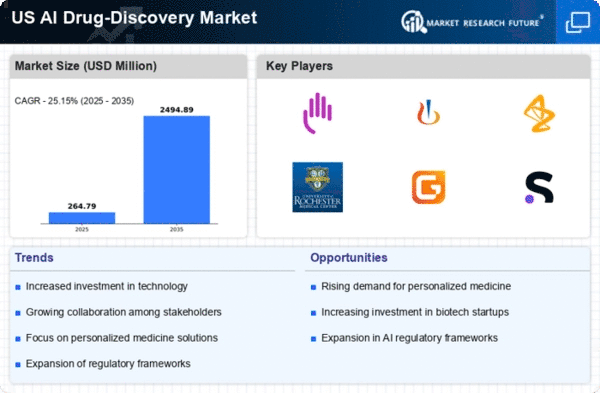Growing Focus on Drug Repurposing
The ai drug-discovery market is witnessing a growing focus on drug repurposing, which involves identifying new therapeutic uses for existing drugs. This approach is particularly appealing in the US, where the average cost of developing a new drug can be prohibitively high. By leveraging AI algorithms, researchers can analyze existing drug databases to uncover potential new applications, significantly reducing the time and resources required for drug development. The market for drug repurposing is expected to expand, with estimates suggesting it could reach $50 billion by 2026. This trend not only accelerates the availability of treatments but also enhances the efficiency of the drug discovery process, making AI an invaluable asset in the quest for innovative therapies.
Advancements in Computational Power
The ai drug-discovery market is significantly influenced by advancements in computational power, which enable the processing of complex biological data at unprecedented speeds. The proliferation of high-performance computing systems and cloud-based platforms has transformed the landscape of drug discovery. In the US, the computational power available for AI applications has increased exponentially, allowing researchers to simulate molecular interactions and predict drug efficacy with remarkable accuracy. This capability reduces the time and cost associated with traditional drug development processes, which can exceed $2.6 billion per new drug. As a result, pharmaceutical companies are increasingly adopting AI-driven methodologies to streamline their research and development efforts, thereby enhancing their competitive edge in the market.
Rising Demand for Personalized Medicine
The ai drug-discovery market is experiencing a notable surge in demand for personalized medicine, which tailors treatments to individual patient profiles. This shift is driven by advancements in genomics and biotechnology, enabling more precise targeting of therapies. In the US, the market for personalized medicine is projected to reach approximately $350 billion by 2025, indicating a robust growth trajectory. As healthcare providers increasingly seek to enhance patient outcomes, the integration of AI technologies in drug discovery becomes essential. AI can analyze vast datasets to identify unique biomarkers, thereby facilitating the development of customized therapies. This trend not only enhances the efficacy of treatments but also aligns with the growing emphasis on patient-centric healthcare, positioning the ai drug-discovery market as a pivotal player in the evolution of modern medicine.
Increased Collaboration Among Stakeholders
The ai drug-discovery market is characterized by increased collaboration among various stakeholders, including pharmaceutical companies, academic institutions, and technology firms. This collaborative environment fosters innovation and accelerates the development of AI-driven solutions in drug discovery. In the US, partnerships between biotech firms and tech companies have become more prevalent, with joint ventures focusing on harnessing AI capabilities to enhance drug development processes. Such collaborations can lead to the pooling of resources and expertise, ultimately driving down costs and improving outcomes. As the landscape evolves, the ai drug-discovery market is likely to benefit from these synergistic relationships, which may result in groundbreaking advancements in therapeutic development.
Regulatory Evolution Supporting AI Integration
The ai drug-discovery market is positively impacted by the evolving regulatory landscape that increasingly supports the integration of AI technologies in drug development. Regulatory bodies in the US are recognizing the potential of AI to enhance the efficiency and safety of drug discovery processes. Initiatives aimed at providing clear guidelines for the use of AI in clinical trials and drug approval processes are emerging. This regulatory evolution not only instills confidence among stakeholders but also encourages investment in AI-driven solutions. As a result, the ai drug-discovery market is likely to see accelerated growth, with companies more willing to adopt innovative technologies that align with regulatory expectations.

















